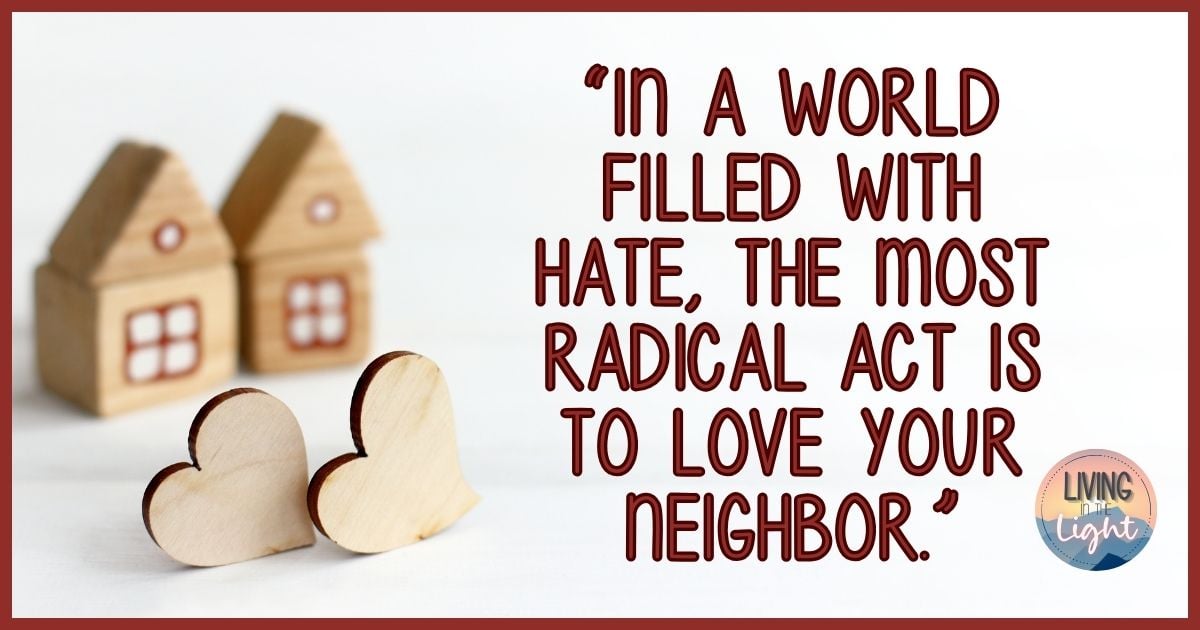Scroll through the headlines or your social media feed and you’ll find no shortage of anger, division, and hostility. Neighbors glare across fences, political opponents treat each other as enemies, and family gatherings fall apart over disagreements. Even online, where people should feel more connected than ever, hatred often sounds louder than kindness. The world is in need of more love.

Somewhere along the way, we’ve lost the ability and even the willingness to love one another. And yet, at the very core of the Christian faith, Jesus gives us a command that sounds almost too simple: “You shall love your neighbor as yourself.” (Matthew 22:39).
It sounds basic. But in a world like the one we are living in today, it feels radical.
Love Is Not a Suggestion
When Jesus gave the command to love our neighbors, He wasn’t offering a piece of optional advice for when life feels comfortable. He was declaring the very heartbeat of Christianity.
When asked to name the greatest commandment, Jesus said:
- Love God with all your heart, soul, and mind AND…
- Love your neighbor as yourself.
Then He added: “All the Law and the Prophets hang on these two commandments.” (Matthew 22:40).
That’s profound. The entire Old Testament – centuries of law, prophecy, history, and worship – is summed up in love. If we miss love, we miss the very point of God’s Word.
Love is What Matters Most
The Apostle Paul wrote: “Though I speak with the tongues of men and of angels, but have not love, I have become sounding brass or a clanging cymbal. And though I have the gift of prophecy, and understand all mysteries and all knowledge, and though I have all faith, so that I could remove mountains, but have not love, I am nothing.” (1 Corinthians 13:1–2)
Therein lies the danger: we can look “spiritual,” we can know our theology, we can even serve faithfully, but if love is missing, it all collapses. Without love, Christianity becomes a hollow performance.
Let’s be honest, love isn’t tested in easy situations. It shines brightest when it costs us something. It’s easy to love when people agree with us, treat us kindly, or live like we do. But Jesus raises the bar:
“But I say to you, love your enemies, bless those who curse you, do good to those who hate you, and pray for those who spitefully use you and persecute you” (Matthew 5:44).
That’s not a suggestion, it’s a command. This is the essence of discipleship. To follow Jesus means to love beyond convenience, beyond comfort, and beyond categories.
Who Really Is My Neighbor?

If we’re honest, one reason we struggle with Jesus’ command is that we want to narrow down who counts as a “neighbor.” Surely, we think, God doesn’t mean the difficult coworker, the family member who hurt us, or the stranger who looks nothing like us.
That was the very question a religious expert asked Jesus: “And who is my neighbor?” (Luke 10:29). Jesus answered with one of His most famous parables: the Good Samaritan.
In the story, a man is beaten and left for dead on the side of the road. A priest passes by. A Levite passes by. Both religious leaders choose distance over compassion. But then comes a Samaritan, a person from a despised, distrusted ethnic group in Jewish society. The Samaritan doesn’t just stop to help. He pours oil on the wounds, pays for shelter, and promises to cover the man’s expenses until he is well.
The shocking twist in the parable was clear: the true “neighbor” wasn’t the one who looked most religious. It was the outsider who chose to show mercy.
For us today, that parable refuses to let us limit “neighbor” to people who look like us, vote like us, or live near us. Our neighbor is the person in need, the outsider, and even the one we’d rather avoid.
In fact, the very people who test our patience or stretch our comfort zones may be the ones God uses most to shape our faith. When we learn to love across divides, we mirror the heart of Christ, who loved us while we were still sinners (Romans 5:8).
(Want to Dive Deeper? Read About How the World is Going Crazy, Click Here)
Love That Costs Something
The Bible doesn’t let love remain a warm feeling or inspirational quote. It turns love into action and often action that costs us something.
- Compassionate love: “And be kind to one another, tenderhearted, forgiving one another, even as God in Christ forgave you.” (Ephesians 4:32)
- Sacrificial love: “Greater love has no one than this, than to lay down one’s life for his friends.” (John 15:13)
- Active love: “My little children, let us not love in word or in tongue, but in deed and in truth.” (1 John 3:18)
Biblical love is fierce, not fragile. It requires forgiveness, patience, and humility. Biblical love requires us to care for people who may never thank us. It means showing kindness when we’d rather stay silent and serving even when it interrupts our comfort.
(To Read About the Greatest Love Story of All Time, Click Here)
A Radical Answer to a Hateful World
It doesn’t take long to see that hatred has gone mainstream. Outrage sells. Division trends. Anger grabs attention. The louder the conflict, the more it seems to dominate our culture.
But Jesus calls His followers to live differently. Love is the radical alternative in a world addicted to hostility.
When we choose to love, we:
- Mirror the heart of Christ.
- Break down walls society builds.
- Offer hope where cynicism reigns.
In fact, love may be the most powerful testimony we have. A skeptical world isn’t persuaded by arguments as much as it is by authenticity. When people see real love, love that is costly, inconvenient, and breaks barriers, they see Jesus.

(To Read About the Importance of Humility, Click Here)
The Real Test of Faith
So let’s return to the question: “What does your faith say about being loving to your neighbor?”
If you follow Jesus, the answer is simple: it isn’t optional. Love is not just a good idea, it’s a test of our faith.
The real challenge is not whether hatred fills the headlines. It does – every single day. The challenge is whether Christians will rise above the noise and choose to live differently. Because in the end, Jesus gave us the standard by which the world will recognize His people:
“By this all will know that you are My disciples, if you have love for one another.” (John 13:35)
In a world starving for grace, the most radical thing we can do is also the most simple: love one another.
Blessings,
Amy
“I’d love to hear from you! Please feel free to share your insights, experiences or questions in the comments section at the bottom of the page.”













